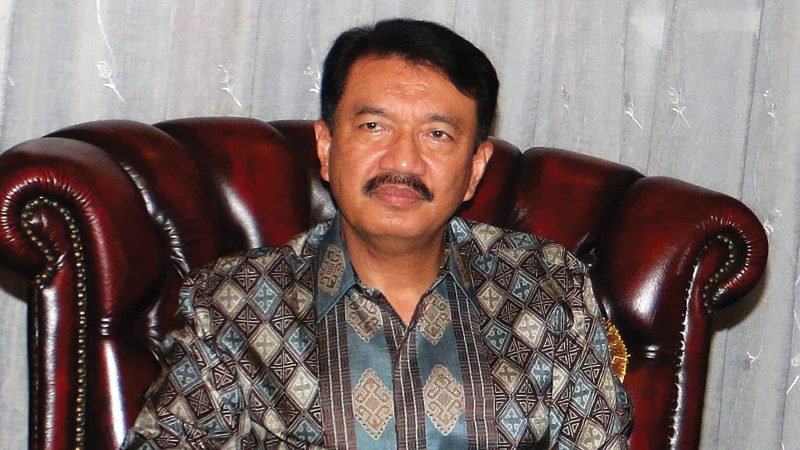Indonesians are being royally scammed when law enforcers use their power to attack opponents of the country’s endemic corruption.
“Five hundred thousand rupiah, mister!” demanded the smirking policeman who had pulled me over on a Sunday afternoon in North Jakarta last month. He was requesting a bribe because I was not carrying my passport. Instead, I had an original KITAS (residency permit) and a photocopy of my passport’s data page.
When I asked him which regulation states that a KITAS is an unacceptable form of identification, the policeman reduced the requested bribe to Rp.100,000. I felt like telling him that begging and corruption are illegal, but I just smiled and waited until he eventually let me continue.
The official vision of the National Police is to “professionally and proportionally uphold the supremacy of the law and human rights”. The 2002 Police Law states that police are directly under the authority of the president. Yet the latest war of some senior police against the respected Corruption Eradication Commission (KPK) has been anything but proportional and for a while it seemed the force was not under the control of President Joko ‘Jokowi’ Widodo.
Fortunately, Jokowi intervened in the conflict last week by cancelling the inauguration of Commissioner General Budi Gunawan as the next National Police chief in response to a public outcry over corruption allegations.
Budi, who was nominated by the president on January 9 and then endorsed by parliament, has long been close to former president Megawati Sukarnoputri, to whom Jokowi is indebted because she was the crucial backer of his rise to the presidency last year.
The Financial Transaction Reports and Analysis Centre had in 2008 found suspicious transactions involving bank accounts of Budi and his son Herviano ‘Vinno’ Widyatama. In 2005, when Vinno was 19, one of his accounts received a transfer of $5.9 million, some of which was transferred to one of Budi’s accounts.
The KPK on January 13 declared Budi a suspect, accusing him of taking bribes when he headed the Career Development Bureau at Police Headquarters over 2003-2006 and during other positions. Budi’s declared assets had soared from Rp.4.6 billion to Rp.22.6 billion ($364,000 to $1.8 million) between 2008 and 2013, whereas his monthly take-home pay was under Rp.18 million. He claimed his wealth grew because dozens of his properties had appreciated in value.
Police retaliated against the KPK by digging up old cases against its leaders and declaring two of them suspects. The KPK’s 21 investigators are also being targeted for allegedly possessing guns with expired licenses – for which the penalty is 20 years in jail.
The judiciary last week came to the assistance of police. South Jakarta District Court ruled that Budi should no longer be a corruption suspect because he was in an administrative position when the alleged crimes occurred and the “gifts” he received did not cause state losses. The ruling was made by Judge Sarpin Rizaldi, who has been accused in the past of accepting bribes to hand down favourable verdicts.
South Jakarta District Court has long been known as “the graveyard of corruption cases” for ruling in favour of some of the country’s biggest graft suspects. Many of its not guilty verdicts were subsequently overturned by higher courts.
It’s not surprising that some judges lack courage. South Jakarta District Court in 1999 exonerated former dictator Suharto’s youngest son, Hutomo ‘Tommy’ Mandala Putra, in a corruption case that cost the state Rp.95.4 billion. The Supreme Court later overturned the verdict and sentenced Tommy to 18 months behind bars. He responded by commissioning the assassination of the judge who convicted him. Tommy was eventually punished by spending under five years in luxury jail conditions, where his girlfriends could visit him and he routinely took leave for alleged medical reasons.
The message was clear: judges who punish the powerful risk being murdered and the villains will not be properly punished.
Police opposed to corruption within their ranks also risk retribution. Endang Tarsa, a police officer serving as the KPK’s director of enforcement, was urged by senior police to testify that Budi’s indictment was due to a vendetta by KPK Chairman Abraham Samad and Deputy Chairman Bambang Widjojanto. When he insisted the indictment was in line with procedures, he was allegedly threatened, resulting in his family being taken to a safe house.
Taxpayers are not thrilled to be funding the salaries of officials who seem to be intent on emasculating the KPK. One senior newspaperman posted on Facebook: “As you file your tax returns (SPT) in the coming weeks, remember some of your money has gone to pay for the police upkeep, including for the daily rally by thousands of officers outside the South Jakarta District Court this past week, and most likely to pay the fancy lawyers they have hired to defend their leaders. Your money has also gone to pay for the high salaries of politicians in parliament who have been farting around for much of the past six months. Don’t forget to add a note of thanks to all these nice people at the bottom of your SPT.”
Former president Susilo Bambang Yudhoyono, often criticized for failing to be sufficiently tough on corruption, is now looking a lot better because he consistently defended the KPK from attacks. Jokowi, on the other hand, was looking weak and his credentials as a reformist were under fire. He managed to regain some credibility after nominating a new police chief—with declared wealth of Rp.8.29 billion ($644,000)—and by appointing three respected interim leaders of the KPK.
Viewed as a clean break from the past when he took office last October, Jokowi was always going to have to make painful compromises with the political elite. Some optimistic pundits felt he was playing smart by allowing the police and the pro-Budi parliament to reveal their true colours – and he has now saved the day at the last minute. Others claim that any sustained attack on KPK will result in something like the 1998 mass protests that brought down Suharto. That’s unlikely because the ’98 protests were fuelled mainly by economic hardship.
Although Jokowi’s approval ratings have slumped in recent weeks, he has made some achievements, such as removing gasoline subsidies, enabling the government to significantly increase infrastructure spending. That’s welcome news to investors, but they would also like Indonesia to have greater law enforcement and better education. The president still has more than four-and-a-half years to get things straight.
As for the KPK, its new leaders may think twice before accusing police of corruption. It should be no surprise that the agency came under fire, but rather that it has functioned so well since its inception in 2003, successfully prosecuting legislators, former ministers, governors, police and tycoons.
Next time I’m pulled over by police and bribe is solicited, I’ll keep on smiling, perhaps chat about illegal parking and hope they find bigger fish actually worth frying.




